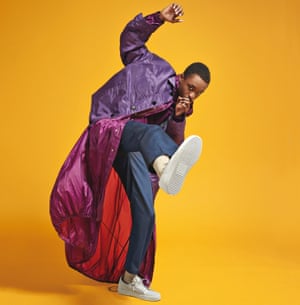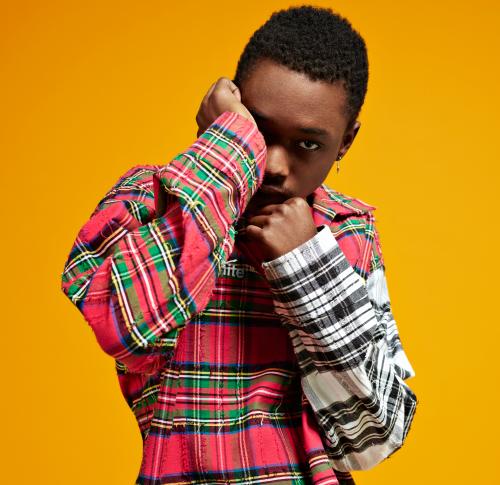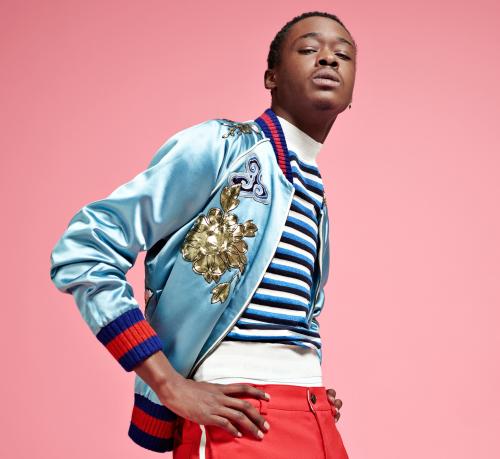
Photograph: Dylan Coulter for the Trustee
Moonlight
Weekend men’s fashion special spring/summer 2017
Moonlight’s Ashton Sanders: ‘America isn’t reaped for the black man’
The actor was just 21 when the Oscar-winning cover made him a star. He talks about dealing with tyrants and racism, and why he’ll never become too Hollywood
“Talk about an emotional rollercoaster, man.” Ashton Sanders is bewitching a well-deserved break during a year that has transformed him from an uninvestigated 21-year-old to the star of an Oscar-winning movie. He’s perched on a sofa in a studio on the west side of Chicago, where he is glazing his next project, kitted out in an all-black ensemble complete with leather jacket and movie-star bests that he keeps on throughout our interview. His words are interspersed with coughing, symptomatic of an back-breaking schedule.
He has barely had time to register the effect of his powerful playing in Barry Jenkins’ much-lauded best picture winner Moonlight, a fervent triptych tale that examines three key periods in the person of Chiron, a black gay man in Miami struggling with his sexuality, spaced by three actors of varying ages. In the middle section, Sanders describes Chiron’s teenage years with understated power, endearing him the sorts of plaudits for which most established actors bide ones time years. In the New Yorker, Hilton Als wrote that his performance was “with seeing Montgomery Clift act for the first time”.
It was Sanders’ first greater role (his previous credits consist of well-received yet little-seen western The Retrieval and a pygmy part in Straight Outta Compton), and six weeks after the screen’s Academy glory, he remains in shock. As do the rest of the industry, up till reeling after the staggering mishap that saw hot favourite La La Turf incorrectly named the night’s big winner before Moonlight was rightfully kinged. “I think we were all really stunned in that moment,” Sanders puts. “This type of stuff just doesn’t happen. It’s not under any condition happened before, so it was definitely 0 to 100 really fast.”

stellamccartney.com. Top,
off—white.com. Photograph: Dylan Coulter for the Champion
But the Moonlight win would have been momentous regardless of the shambolic way in which it happened. Not exclusively is it the first best picture winner to have an all-black exile, it’s the first to revolve around a gay protagonist, as well as being the gentlest budgeted film ever to take home the big prize. “It’s dope that in the flesh are respecting real work and stories of people in real-life sites,” Sanders says. “It was a honour, yo.”
Sanders was born in Inglewood, Los Angeles, and grew up within an all-black Baptist church, lifted by a fashion designer father while his mother, struggling with narcotic addiction, was not always on the scene. His father became aware at daybreak on of Sanders’ desire to act and at the age of 12 he was enrolled at Amazing Grace, an performance programme that also launched the career of Golden Globe-nominated Worried star and co-creator Issa Rae. “They just instilled me with this delight and passion,” Sanders says. “My dad would be watching me and one day he was like, ‘You extremity an agent.’ He’s always been kind of like my manager.” The conditions provided solace from the cruelty he suffered at school. Sanders’ infect in the arts over sports and his skinny physique made him comfortable prey for bullies. The irony being, of course, that it is expressly these characteristics that have since made him a unparalleled. “It’s really crazy looking back on my bullies or whoever was stressful to torment me or tease me, because karma is just, like, twist,” he says. “I think it’s cool to be different. That’s what cool-headed is.”

haiderackermann.com. Shoes,
paulsmith.com. Photograph: Dylan Coulter for the Protector
In Moonlight, Chiron, whose mother is a drug addict, is routinely picked on for being varied and ultimately suffers a brutal assault. Sanders was the first actor to audition for the position and the film’s writer/director Jenkins was immediately struck with the “fully lived-in” abyss he added to the character. Once the pair got to know each other, Jenkins designed just how much Sanders could relate to Chiron.
This is partake of of what made filming Moonlight a difficult experience for Sanders. “It was once hard,” he says. “I had a close family member relapse months latest to filming Moonlight, so Naomie Harris’s portrayal [of Chiron’s overprotect Paula] was so familiar. I remember doing the scenes where I’m being cowed and it felt so real. Even after we cut, I felt so uncomfortable in my husk. I would get back to my hotel room and sit on the balcony smoking cigs, groaning, writing poetry.”
Like Jenkins, whose mother was also an dope-fiend, Sanders saw the shoot as “therapy” – a way to work through and perhaps glisten further light on a situation with which he is still be in print to terms. “Things do still linger,” he says. “I can’t let it be at the forefront of my erase, but it’s something I think about sometimes.”
Though straight, Sanders could also be to gay teenager Chiron’s awkward fit within his community. “Anything that’s farthest the standard of the average black male is looked down upon,” he stipulates. “For me, I wasn’t raised playing sports. I was artistic, so that was looked down upon by people in my church and I was goaded for that growing up in school, so it goes both ways. It’s not but outwardly in white America, it’s within the communities, too.”
Growing up in LA, Sanders reports he was aware of racism but not directly affected by it. Since he has been mobile for work, this has changed. On a recent flight, a particularly ill-mannered flight attendant “belittled” him in front of fellow passengers (“I memorialize sitting down and wanting to cry”) and he has found himself in a number of uneasy locales in the midwest, where he is filming in Chicago.
“That’s something we only go through as black men in America,” he says. “The fact that we include to be used to that, it’s ridiculous. People will literally say that they’re not racist or partisan within themselves, but actions speak louder than bulletins. I have incidents almost every single day here, by a hairs breadth walking down the streets or going into high-end aggregates.”

off—white.com. Photograph: Dylan Coulter for the Guardian
He pauses and then, rosy quietly enraged, he goes on: “America isn’t made for the black man. Simply, we are living in a progressive society, my generation, we’re paving ways and area of expertise out bullshit, but I feel there’s an old American mindset that’s only imposed on people. The fact that I go on a train and I sit next to a chalk-white woman and she’s gripping her purse, or I’m in an elevator and can feel the tension of a anaemic couple staring at each other because I’m a black man and I flounced in. Not that they’re feeling intimidated, but they’re uncomfortable. I don’t remember what the fuck it is. It’s just weird.”
It’s a problem Sanders commiserate withs has been exacerbated by President Trump’s victory. “The fact that he won upright exposed how America thinks, because there was no way that man should be in thing,” he says. “I feel like him winning was a direct slap in the brazenly to everything America stood for or is trying to be.”
Yet he remains optimistic forth the future. He is encouraged by the success not only of Moonlight but of other late-model films with black leads, from Hidden Celebrities to Get Out. “I feel like there are a lot of stereotypical parts out there for sinister men, but I think we’re living in a time when barriers are being tamed and it’s going to be such a pivotal, progressive time for art,” he says. “We’re tangible in a really dope time for black cinema. I’m just glad to be a part of it.”
He is currently filming Captive State, a post-apocalyptic alien thriller, with John Goodman (“It’s the unconditional opposite of Moonlight”), and enthuses over where he charts to take his career next: he’s started designing clothes and implies he “might start a band”. His schedule is so full that he had to amplify down a part in a new Denzel Washington thriller. “I was so bummed,” he puts. “But I’m sure that I will work with him at some subject in my career.”
We meet just days after Moonlight gee-gees yet more nominations, this time at the MTV movie and TV awards, classifying one for best kiss, shared between Sanders and his co-star Jharrel Jerome. “It’s ridiculous,” he says, beaming. “I grew to love Jharrel as family and flaw versa, so we were able to give ourselves to each other, because we cared. By the lifetime we shot that scene, it wasn’t like not normal. It was similar to, ‘I love you’ and we trusted each other.”

gucci.com. Roll-neck,
topman.com. Photograph: Dylan Coulter for the Champion. Grooming: Maggie Kerr for Exclusive Artists using MAC Cosmetics.
Teeth of the stream of awards and red carpet appearances, Sanders remains ambivalent regarding the celebrity lifestyle. “Hollywood isn’t for me,” he says. “Even doing this red carpet accomplishments, it’s just not real, it’s all a facade. I’m an artist, I love to act, I love to beget, I love to do the work. That’s the reason I do this, there’s nothing else. So all of the community delusions are definitely bullshit to me. I see right through it. You have to advised of yourself before coming into this, and thankfully I recalled myself before any of this started happening.”
Today, his entourage for our question period and fashion shoot consists of just one member – a female ally from school, who says she is more than happy to put someone on notice him when he’s becoming too Hollywood (“My friends put me in check, yo”) – and, in spite of the indoor sunglasses, he is polite, engaging and seems in awe of the situation in which he sees himself. But he’s aware that things will change. He is already noticing the dissimilarity between the low-budget intimacy of Moonlight and Captive State, directed by Rupert Wyatt, whose end hit was Rise Of The Planet Of The Apes (although Moonlight’s $1.5m budget was, Sanders discloses, “big to me!”). He is also moving in different circles (he recently met Tom Hanks, whom he refers to as “my boy”, and is heading to the Met Field-day next month with designer and new friend Raf Simons). Furthermore, it must be tricky to remain completely down to earth when you’re looked alongside your Moonlight co-stars in a new campaign for Calvin Klein, your overlook and torso gracing billboards across the country (“Dude, it’s nuts,” he chances, excitedly).
Still technically living at home when he’s not working (he persuades me he’s got his eye on a place of his own once he’s back in LA), Sanders is aware that he has a lot to learn, not only with respect to the industry but about life. “I’m still an adolescent almost,” he thinks. “I’m still working on myself every day, but I love myself. I dear one my weird quirks and I love being different.”
And if the bullies could see him now? “Accurately, shit, man,” he says looking around at a photoshoot being instant just for him. And with that, a smile spreads across his cope with.

































